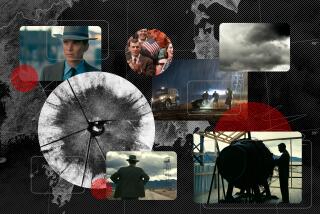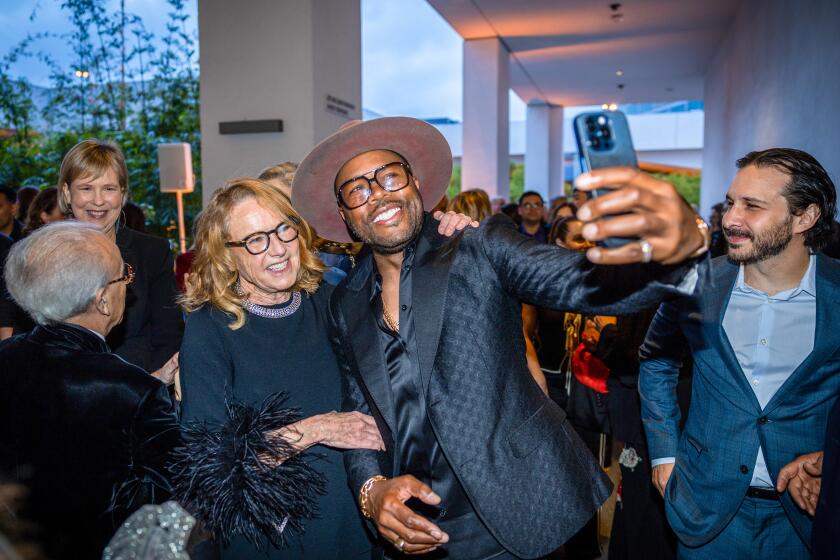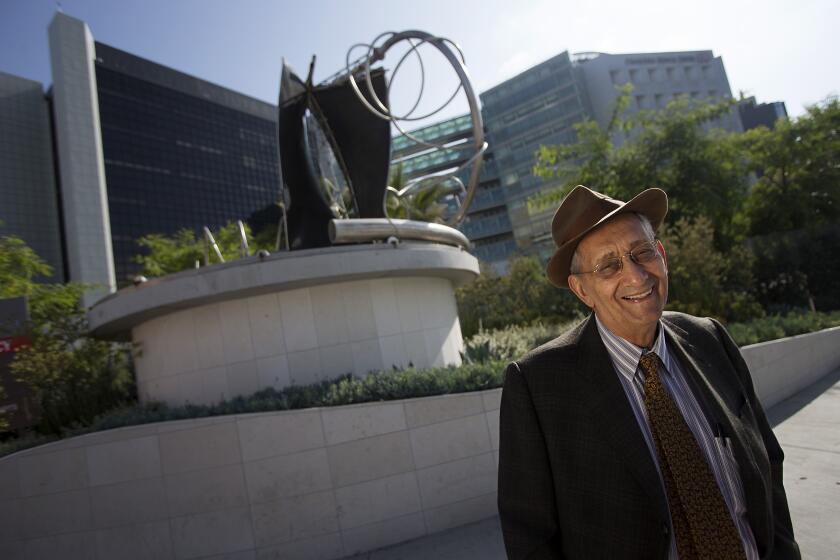TONY KUSHNER : ‘Millenmium’s’ Arrival
As almost no American play has ever done, Tony Kushner’s “Angels in America: A Gay Fantasia on National Themes” has been a rapid triumph in Los Angeles, San Francisco, London and Broadway, with a Pulitzer Prize and multiple Tony Award nominations in the process--and all on the uncompromising terms of its maker.
Huge yet intimate, the play is actually two: “Millennium Approaches” (the section now on Broadway) and “Perestroika” (due there in the fall), fiercely tackling AIDS, political and personal betrayals and the scourge of the country’s social tribes. Filmmaker Tom Bywaters, whose “Jammin’: Jelly Roll Morton on Broadway” showed the making of George Wolfe’s “Jelly’s Last Jam,” has documented “Angels’ ” Broadway arrival for PBS’ “Great Performances.” Kushner talked with writer Robert Koehler about his play’s incredible ride.
With everything you’ve been through, between all the awards and media attention and the enormous pressures of opening a difficult play on Broadway, why did you agree to let a camera follow you around?
Because I’m a masochist. No, really, the idea behind the film seems apt: to show how the play came to be, to hear what the various participants think about the play and its issues. And because it’s having a good Broadway run, that is a signpost of the cultural changes involving how gays and lesbians are seen in the larger culture. This “Great Performances” production is a manifestation of that. We wanted to let people see how it was done, and that the play is fun, and that non-gays can get a lot out of it.
So is this in a sense a kind of alternative “commercial” for the play?
We are using it as a way of getting the word out on the play, to be completely honest. But I thought it was important to document the work, and I think Tom is the best one to do it. His film of the making of “Jelly’s Last Jam” didn’t traffic in the usual cliches of the behind-the-scenes documentary, and showed a true account of how a show is actually put together. What pleased me more was that Tom didn’t want it to start with the Broadway opening, but explore how the play was formed. So my friend and inspiration Kimberly Flynn is in it, and above all, Oskar Eustis, who served as director and dramaturge on it for nearly five years.
In fact, didn’t Los Angeles play a crucial role in “Angels’ ” development?
We had quite an experience in L.A. When “Millennium Approaches” opened at Taper, Too (in May, 1990), most of the critics sniffed at it. It was very upsetting, and I felt the production had been a failure. ... Then something happened that’s never happened in my career before: a week into the run, I started getting calls from people trying to get in because there were constant sellouts. The show had settled into place, and then London producers came, which led to a great run there. The Taper’s commitment stayed incredibly strong throughout, from then to last year’s mainstage production of both parts of “Angels,” to now.
Yet even before this, when the play was commissioned by the Eureka Theatre in San Francisco, it was meant to be a small, easily producible play. How did it explode into a seven-hour epic?
I had a lot more to say than i realized. It simply exploded from within, mainly because I had never really written before about being gay in America. It was really my second play, and the first to deal with the times I lived in. I set up a complicated set of characters, plus an interconnected set of issues ranging from AIDS to Mormonism. Between writing the second and third acts of “Millennium Approaches,” I realized that it had a life of its own. In my past work, what I planned was what I wrote. That was simply not the case with “Angels.”
One of the crucial decisions you made for the Broadway opening was selecting George Wolfe to replace Eustis as director. What was behind the decision?
George and Oskar are terrifically different directors, and it’s simply the case--for a whole host of reasons--that Oskar and I work together better as playwright and dramaturge than as playwright and director. Our working experience wasn’t happy enough, and not everything at Taper was what I wanted. And not everything I did made him feel free as a director. Though it was a terribly difficult, painful thing to do, I really couldn’t see how we could continue a collaboration without driving each other crazy, especially since we want to work together on other projects in the future. And contrary to what’s been written, it was a mutual decision made a month before the L.A. reviews came out.
When Bywaters started following you around during the Broadway rehearsals, what did you talk about?
I never completely forgot that his camera was there. I talked about the difficulty of writing plays, the place of gays and lesbians in America, the difficulties of the Reagan era. I did talk a little about personal matters, but I try to discourage reading the play as encoded autobiography. I’m concerned that nationalism of any kind isn’t a good thing, that disempowered groups need to form common ground because they have more in common than not.
How do you think television can help theater?
One of the best things it’s done is allow playwrights to write for the medium, which has produced some kinkier, riskier forms. We’re now seeing HBO doing “The Kentucky Cycle,” which is very exciting, or George’s recent adaptation of “Fires in the Mirror,” or what Tom has done here. Theater will always be a source of radical thinking that TV needs to dip into.
“In the Wings: ‘Angels in America’ on Broadway” airs Friday at 9 p.m. on KVCR and 10:30 p.m. on KCET.
More to Read
The biggest entertainment stories
Get our big stories about Hollywood, film, television, music, arts, culture and more right in your inbox as soon as they publish.
You may occasionally receive promotional content from the Los Angeles Times.






